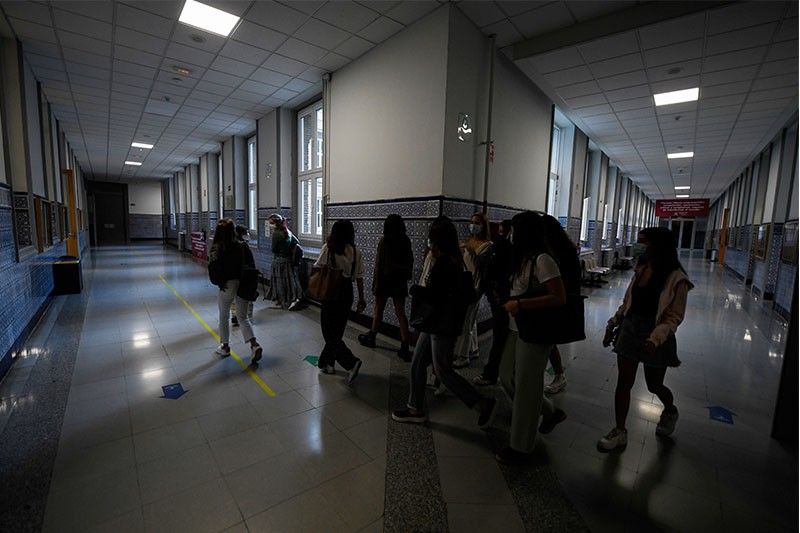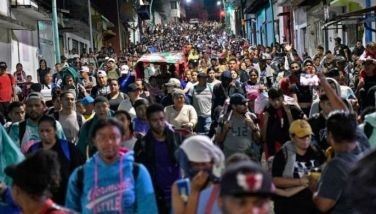Spain, India crash through coronavirus milestones

MADRID, Spain — Spain passed the landmark figure of 500,000 coronavirus infections on Monday as India reopened some metro lines despite becoming the world's second most affected country.
Spain had largely gained control over its outbreak by imposing one of the world's toughest lockdowns, but infections have surged since the restrictions were fully removed at the end of June.
The country became the first in western Europe to hit the 500,000 mark -- albeit with a far lower death rate and many more asymptomatic cases than were recorded during its previous peak in late March and early April.
"The situation is much more favourable but we remain in an upwards phase," said health official Fernando Simon.
But the overall caseloads in European countries are dwarfed by India's 4.2 million confirmed infections.
Nevertheless, economic necessity pushed the South Asian nation to risk reopening transport lines on Monday -- metros began running again in the capital New Delhi after a five-month shutdown and 12 other cities also restarted subway services.
"For our lives to move on, we have to get out of our homes... so this is a good move by the government," on commuter Deepak Kumar on the Delhi subway told AFP.
Passengers are obliged to wear masks, keep their distance and undergo temperature checks.
'Like guinea pigs'
India leapfrogged Brazil to become the world's second-hardest hit nation after the United States, with the virus having caused almost 890,000 deaths and more than 27 million infections worldwide.
As governments around the world have moved away from the idea of blanket lockdowns, countries in all continents have been experimenting with targeted measures to deal with infection spikes.
England fiddled with its overseas quarantine rules again on Monday, imposing restrictions on travellers from seven Greek islands popular with holidaymakers.
Morocco imposed a lockdown on Casablanca and shut schools on the day they were supposed to reopen after a surge in cases in the city.
Officials said the virus risked overwhelming the country if it was not controlled, but some parents were left fuming.
"They were on cloud nine over returning to school tomorrow," wrote one father on Twitter. "How do you explain this to a six-year-old and an eight-year-old?"
In Spain, parental anger flowed in the other direction, with fears rising that schools were opening too soon with millions of pupils returning on Monday.
"Going back to school is being treated like an experiment, we're like guinea pigs," said Aroa Miranda, a 37-year-old mother-of-two.
France put seven more regions on a red list on Sunday after regularly recording daily infection rates of between 7,000 and 9,000 -- although the figure fell dramatically on Monday.
Israel announced a "nightly closure" of 40 cities and towns with the highest infection rates with Prime Minister Benjamin Netanyahu accepting the measures were not ideal but saying there was "no way to avoid them".
Olympic hope
The coronavirus fallout continues to ricochet around the sporting world, with French footballer Kylian Mbappe the latest in a long line of footballers to test positive.
Many tennis players have also been infected, galvanising organisers of the French Open later this month to impose strict guidelines.
All players will be housed in two designated hotels "without exception" to reduce the risk, said tournament director Guy Forget, who also said far fewer spectators would be allowed to watch than initially planned.
Both tennis and football have seen their calendars ripped to shreds by the virus, but the biggest single casualty has been the Tokyo Olympics, which were due to take place this summer.
International Olympic Committee vice president John Coates offered a note of hope on Monday, saying the rescheduled Games would go ahead next year regardless of the pandemic.
"These will be the Games that conquered Covid, the light at the end of the tunnel," Coates told AFP in an exclusive interview. — Alvaro VILLALOBOS with AFP bureaus
Follow this page for updates on a mysterious pneumonia outbreak that has struck dozens of people in China.
New Zealand Prime Minister Chris Hipkins says on Sunday that he had contracted COVID-19, testing positive at a key point in his flailing campaign for re-election.
Hipkins saYS on his official social media feed that he would need to isolate for up to five days -- less than two weeks before his country's general election.
The leader of the centre-left Labour Party said he started to experience cold symptoms on Saturday and had cancelled most of his weekend engagements. — AFP
The World Health Organization and US health authorities say Friday they are closely monitoring a new variant of COVID-19, although the potential impact of BA.2.86 is currently unknown.
The WHO classified the new variant as one under surveillance "due to the large number (more than 30) of spike gene mutations it carries", it wrote in a bulletin about the pandemic late Thursday.
So far, the variant has only been detected in Israel, Denmark and the United States. — AFP
The World Health Organization says on Friday that the number of new COVID-19 cases reported worldwide rose by 80% in the last month, days after designating a new "variant of interest".
The WHO declared in May that Covid is no longer a global health emergency, but has warned that the virus will continue to circulate and mutate, causing occasional spikes in infections, hospitalisations and deaths.
In its weekly update, the UN agency said that nations reported nearly 1.5 million new cases from July 10 to August 6, an 80% increase compared to the previous 28 days. — AFP
The head of US intelligence says that there was no evidence that the COVID-19 virus was created in the Chinese government's Wuhan research lab.
In a declassified report, the Office of the Director of National Intelligence (ODNI) says they had no information backing recent claims that three scientists at the lab were some of the very first infected with COVID-19 and may have created the virus themselves.
Drawing on intelligence collected by various member agencies of the US intelligence community (IC), the ODNI report says some scientists at the Wuhan lab had done genetic engineering of coronaviruses similar to COVID-19. — AFP
Boris Johnson deliberately misled MPs over Covid lockdown-breaking parties in Downing Street when he was prime minister, a UK parliament committee ruled on Thursday.
The cross-party Privileges Committee said Johnson, 58, would have been suspended as an MP for 90 days for "repeated contempts (of parliament) and for seeking to undermine the parliamentary process".
But he avoided any formal sanction by his peers in the House of Commons by resigning as an MP last week.
In his resignation statement last Friday, Johnson pre-empted publication of the committee's conclusions, claiming a political stitch-up, even though the body has a majority from his own party.
He was unrepentant again on Thursday, accusing the committee of being "anti-democratic... to bring about what is intended to be the final knife-thrust in a protracted political assassination".
Calling it "beneath contempt", he said it was "for the people of this to decide who sits in parliament, not Harriet Harman", the veteran opposition Labour MP who chaired the seven-person committee. — AFP
- Latest
- Trending


































